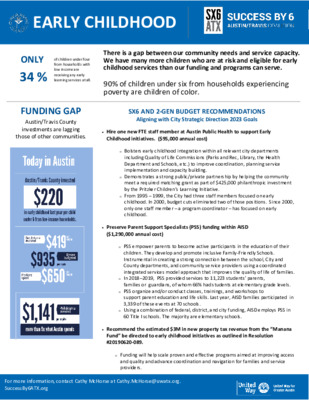Backup — original pdf
Backup

EARLY CHILDHOOD ONLY 34 % of children under four from households with low income are receiving any early learning services at all. There is a gap between our community needs and service capacity. We have many more children who are at risk and eligible for early childhood services than our funding and programs can serve. 90% of children under six from households experiencing poverty are children of color. FUNDING GAP Austin/Travis County investments are lagging those of other communities. SX6 AND 2-GEN BUDGET RECOMMENDATIONS Aligning with City Strategic Direction 2023 Goals • Hire one new FTE staff member at Austin Public Health to support Early Childhood initiatives. ($95,000 annual cost) o Bolsters early childhood integration within all relevant city departments including Quality of Life Commissions (Parks and Rec, Library, the Health Department and Schools, etc.) to improve coordination, planning service implementation and capacity building. o Demonstrates a strong public/private partnership by helping the community meet a required matching grant as part of $425,000 philanthropic investment by the Pritzker Children’s Learning Initiative. o From 1995 – 1999, the City had three staff members focused on early childhood. In 2000, budget cuts eliminated two of those positions. Since 2000, only one staff member – a program coordinator – has focused on early childhood. • Preserve Parent Support Specialists (PSS) funding within AISD ($1,290,000 annual cost) o PSS empower parents to become active participants in the education of their children. They develop and promote inclusive Family-Friendly Schools. Instrumental in creating a strong connection between the school, City and County departments, and community service providers using a coordinated integrated services model approach that improves the quality of life of families. o In 2018–2019, PSS provided services to 11,223 students’ parents, families or guardians, of whom 66% had students at elementary grade levels. o PSS organize and/or conduct classes, trainings, and workshops to support parent education and life skills. Last year, AISD families participated in 3,339 of these events at 70 schools. o Using a combination of federal, district, and city funding, AISD employs PSS in 60 Title I schools. The majority are elementary schools. • Recommend the estimated $3M in new property tax revenue from the “Manana Fund” be directed to early childhood initiatives as outlined in Resolution #20190620-089. o Funding will help scale proven and effective programs aimed at improving access and quality and advance coordination and navigation for families and service providers. For more information, contact Cathy McHorse at Cathy.McHorse@uwatx.org. SuccessBy6ATX.org NON-BUDGETARY ITEMS FOR CONSIDERATION: • • Explore opportunities to create an Economic Development Corporation (EDC) as a vehicle to provide tangible support for access to high-quality child care. Expand access to underutilized Austin ISD facilities for one-stop/co-located 2-Gen models serving parents with low income and their children, including community schools and/or schools with Family Resource Centers. CITY OF AUSTIN DATA ON CHILDREN FROM FAMILIES WITH LOW INCOME* Approximate Number of Children Under 6 per Approximate Number of Young Children Living in Low Income Families District (Below 200% FPL) Percentage 1 2 3 4 5 6 7 8 9 10 Total District 8607 7050 6580 8392 7082 8300 7858 6400 3252 5917 69439 5417 4245 4642 6576 2189 1969 2138 1177 776 715 29844 63% 60% 71% 78% 31% 24% 27% 18% 24% 12% 43% Kindergarten readiness is highly predictive of academic performance in 3rd grade, and students not reading on grade level by 3rd grade are four times more likely to drop out of school. MAKING ENDS MEET IN TRAVIS COUNTY Track level data have large margins of errors and for these two reasons, these numbers above are estimates and only approximate numbers. *Source: 2014-2018 American Community Survey 5-Year Estimates; Table B17024 by Census Track. Note: Ryan Robinson, City of Austin Demographer, provided United Way for Greater Austin with information about how Census Tracks map onto/overlap with City Council Districts. This information was used to calculate the percentage of children in each district. Additionally, some of these Census Track level data have large margins of errors and for these two reasons, these numbers above are estimates and only approximate numbers. For more information, contact Cathy McHorse at Cathy.McHorse@uwatx.org. SuccessBy6ATX.org